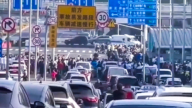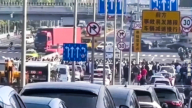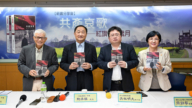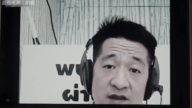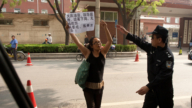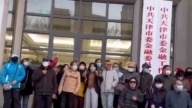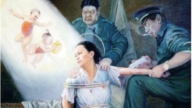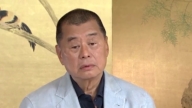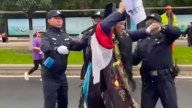【新唐人2014年11月12日訊】美國總統歐巴馬11月10號抵達北京,展開3天的訪問。相較於第一天的大禮,宣佈延長中國人赴美簽證最長有效期,外界更關注的是,歐巴馬重申會繼續關注中國人權問題,並說香港佔中最重要的訊息,是確保避免暴力發生。他強調,美國不會在人權和香港問題上保持緘默。
美國總統歐巴馬在APEC峰會上演講了將近20分鐘,從開場的延長中國人赴美簽證到中美合作,也強調美國將繼續關注中國的人權、新聞自由等問題,並關注中國市場開放、創造公平營商環境等問題。
歐巴馬還希望美中在雙邊投資協議以及減少貿易壁壘上有所進展,並敦促中共當局杜絕網絡盜竊商業利益的行為。
美國總統歐巴馬:「我們期待中國創造一個更公平的競爭環境給外國公司,使他們能與中國企業進行更公平的競爭。……我們期待中國成為一個創新的經濟體,重視知識產權的保護,並杜絕網絡盜竊商業秘密,謀取商業利益。」
針對目前香港爭普選的佔中行動,歐巴馬表示,最優先考慮的是確保避免暴力事件發生。他還說,美方不能漠視中國人權及香港問題。
美國總統歐巴馬:「要捍衛人權和新聞自由,我們提出這項提議不是因為對自己有利,而是為了中國的持續發展以及亞太地區的安定。」
在歐巴馬出訪中國之前,美國參議院外交委員會兩名重量級議員呼籲歐巴馬向習近平提出中國人權問題。參議院外交委員會亞太小組委員會共和黨資深議員馬克•魯比克和該委員會主席本•卡丁致函歐巴馬總統,對中國政府以人權和法治為代價的專制控制表達關注。
時事評論員伍凡:「共和黨是對中共政權相當不滿意,所以歐巴馬這次臨來北京之前,共和黨的兩位參議院的參議員寫信給歐巴馬,要他提人權問題、新聞自由問題,包括香港問題,儘管預料的到,習近平不會按照美國方式來做,但歐巴馬非講不可。」
針對中國人權問題,歐巴馬說:我們不期待中國學習美國模式,但是我們會繼續關注中國的人權問題。
北京維權人士胡佳:「我特別希望,不僅僅是歐巴馬先生,就是說他(歐巴馬)現在不是提到人權嗎?那他應該知道,就是因為這個會議本身造成的限制人權問題,對一個中國普通公民產生莫大的影響。」
因為APEC而被軟禁45天的胡佳舉例,歐巴馬、習近平和自己都有女兒,歐巴馬、習近平都可以自由的和女兒在一起,而自己僅僅因為聲援香港,就被軟禁而無法與女兒相聚,胡佳說,這是中國最現實的一個對比。
北京維權人士胡佳:「我在北京,北京市民抱怨的最多情況,天津市民主要是供暖的問題,說供暖會影響空氣質量,那麼昨天晚上我們看到了APEC那邊放了很多的煙花,他們說是環保煙花也罷甚麼煙花也罷,只是你不能只許州官放火不許百姓點燈啊。」
中共當局為了保證APEC會議的順利召開,加強對訪民的穩控,不允許他們靠近APEC會場。更有訪民收到地方信訪局的電話,以金錢利誘他們不要在APEC期間赴京上訪。
胡佳表示,中共政權不斷變換手法來踐踏人權。比如自己就不再被以「煽動顛覆國家政權罪」的罪名打壓,而是變成所謂的「尋釁滋事罪」。胡佳還說,最近不到兩年的時間內,北京被抓的人數,甚至超過上一屆中共領導班子執政十年的總和。
採訪/朱智善 編輯/黃億美 後製/郭敬
Obama Urges China to Uphold Human Rights in APEC
U.S. President Barack Obama arrived in Beijing on Nov. 10
for his three-day visit to China.
He announced the longest validity visa policy with China,
and reiterated the concern about China ‘s human rights issues.
Obama also expressed that the most critical issue regarding
Hong Kong’s Occupy Central is avoiding violence.
He stressed, the United States would not remain silent
on the human rights issues and HK’s pro-democracy protests.
Obama’s speech at the APEC summit
lasted nearly 20 minutes.
He began with the visa extension for Chinese people
and the cooperation between the U.S. and China.
He also stressed that the U.S. would continue to concern
about China’s human rights, press freedom and other issues,
including China’s market access
and creation of a fair business environment, etc.
Obama hoped that issues regarding the bilateral investment
agreement and the elimination of trade barriers.
He also urged the Chinese authorities to reject
the use of cyber theft for commercial gain
Obama: “We look to China to create a more level playing
field on which foreign companies are treated fairly,
so that they can compete fairly with Chinese companies.…….
We look to China to become an innovative economy
that values the protection of intellectual property rights,
and rejects cyber theft of trade secrets for commercial gain."
As to the Occupy Central movements for HK’s universal
suffrage, Obama said that his priority was to ensure
that violence would be avoided.
He added that the U.S. would not ignore China’s human rights
and the issues regarding Hong Kong.
Obama: “…and yes to stand up for human rights and freedom
of the press.
We don’t suggest these things because they are good for us,
we suggest China do these things for the sake
of sustainable growth in China
and stability in the Asia-Pacific region."
Before Obama’s visit to China, two heavyweights on U.S.
Senate’s Foreign Relations Committee called on Obama
to raise China’s human rights issues
when he met with Xi Jinping.
Senator Marco Rubio (R-FL), ranking member
of the Subcommittee on East Asian and Pacific Affairs
of the Committee on Foreign Relations,
and Ben Cardin (D-Md.), senior senator and chairman
of the Committee, sent a letter to President Obama to express
their concern about the Chinese regime’s authoritarian
control at the expense of human rights and the rule of law.
Commentator Wu Fan: “The Republicans should be quite
dissatisfied with the Chinese regime.
Therefore, prior to Obama’s trip to Beijing this time,
two Republican senators wrote to Obama, asking him
to talk about the issues regarding human rights,
including Hong Kong issues.
Despite the fact that Xi would not follow what the U.S. said,
Obama must touch upon these issues."
In terms of China’s human rights issues, Obama said:
“We don’t expect China to follow an American model
in every instance but we’re going to continue
to have concerns about human rights."
Beijing human rights activist Hu Jia: “I particularly hope that
when Mr. Obama is talking about human rights, he should
know that the restriction on human rights issues in the meeting
itself would have a tremendous impact
on an ordinary Chinese citizen."
Hu Jia, who was under house arrest for 45 days because of this
APEC Summit, used Barack Obama and Xi Jinping
as an example.
Both Barack Obama and Xi Jinping have daughters,
and they can be with their daughters freely.
But only because of his support for the Hong Kong incident,
Hu was placed under house arrest and cannot live
with his daughter.
Hu Jia said that it’s indeed a sharp contrast in China.
Hu Jia: “I live in Beijing.
As to the most common complaints
from Beijing residents…
the main issue in Tianjin area is the heating problem.
They said that heating would affect the air quality;
but last night we saw the tremendous fireworks display
for the APEC meeting.
Whether they referred to them as eco-friendly fireworks
or other kinds of fireworks, I would say that they only
allowed officials to do whatever they want,
but the civilians cannot do anything."
To ensure the success of the APEC meetings, the Chinese
authorities intensified its control over petitioners,
and forbade them from accessing the vicinity
of the APEC venue.
Moreover, some petitioners even received phone calls
from the local petition office, luring them with money
to prevent them from going to Beijing for petition
during APEC meetings.
Hu said that the Chinese regime has employed various tactics
to trample human rights.
Taking him for example, he is no longer suppressed
with the charges of “inciting subversion of state power,"
but the crimes of “picking quarrels and provoking trouble."
Hu added that in a short span of less than two years,
the people being arrested in Beijing has outnumbered
the sum of those who were arrested during rule of the Chinese
Communist Party’s previous leadership over the past decade.
Interview/Zhu Zhishan Edit/Huang Yimei Post-Production/GuoJing


